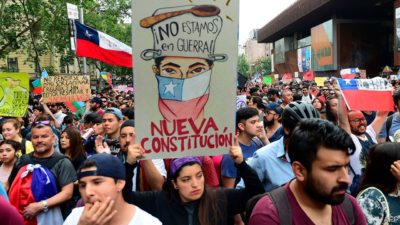
Before the coronavirus pandemic and the plague of locusts came the protesters.
From the affluent locales—Chile, France, Britain, Hong King, Catalonia—to the impoverished ones—Algeria, Bolivia, Ecuador, Guinea, Haiti, Honduras, Iraq, Kazakhstan, Lebanon and more; the world was on fire (to borrow from Amy Chua’s brilliant book).
The reasons cited for a world-wide conflagration ranged from the evils of free-market capitalism (says the Left) to the “socialist regimes in Cuba and Venezuela” (says the Right), to “economics, demography, a sense of powerlessness…and social media.”
Some experts spoke of a “youth bulge” of over-educated young people chasing too few jobs. In truth, this was more like ill-educated youngsters with useless degrees, who thought it chic to don a balaclava and lob hard objects at the police and the property it was protecting.
Chile is the jewel of Latin America. In 2014, it even surpassed the United States on the Index of Economic Freedom, ranking seventh to America’s 12th. Since 1990, economic growth in Chile has been as steady as the stability of its institutions. Poverty rates had plummeted and social services had been extended to the needy.
On the right, Pat Buchanan has described Chile as “the country with the highest per capita income and least inequality in all of Latin America.”
On the Left—yet still on the side of a competitive market economy—the Economist agrees. Chile “is the second-richest country in Latin America, thanks in part to its healthy public finances and robust private sector.”
In no-man’s land are the protestors on the streets of Santiago and other cities. What the demonstrators want is unclear. To the extent their inchoate signs and signals can be divined, it would appear that the path the well-to-do Chile will be forced to take is that of less capitalism and more socialism; less of the private sector and more of the state.
Indeed, Chile is beset with protesters determined to bring the elected government to its knees. Many parts of Santiago, the capital, have been boarded up or burned down. The country’s “malcontents” want more state-provided stuff; more health care and more free education and pensions.
It increasingly looks like Sebastián Piñera, Chile’s president, may just be forced “to scrap a system” that appears to have served Chile well.
One of the Chilean system’s signal features was “developed by free-market economists during the dictatorship of Augusto Pinochet, who ruled from 1973 to 1990.”
Whereas, “in many other countries,” including the American social democracy, “public pensions are financed by taxing current workers and giving the money to current pensioners”; in Chile, explains the Economist, “citizens are expected to save for their own retirement.”
In the United States, the pension promises made by government and underwritten with taxpayer support, have resulted in pension debt to the tune of $5.2 trillion, for states and local governments.
Conversely, Chile’s private scheme has helped the country “manage its public finances and encouraged the development of long-term capital markets, which in turn has boosted economic growth.”
But that’s not how the rioters and looters see solvency and individual responsibility. Theirs is the story of democracy and the quest for government-mediated distribution.
Ditto, the Venezuelan mobs fighting against the forces of Nicolás Maduro. They were not fighting for “freedom,” as classical liberals and conservatives think of it, and certainly not against socialism.
Rather, in opposition leader Juan Guaidó, the anti-Maduro malcontents in Caracas and elsewhere were simply looking for a better, more malleable socialist.
Lech Walesa, an iconic polish political leader, captured the impetus propelling demonstrations across the world. Working-class people are turning on the wealthiest 10 percent of the population, he forewarned. Their motto: “Give us your assets.”
Lower-case, doctrinaire democrats in America doggedly conflate the will of the people across the world with liberty. This Disneyfied view of democracy ignores that, in a democracy, the right to vote gives one man control over another’s life and livelihood.
You see, people with higher incomes constitute a minority, an economically dominant minority. People with low incomes are in the majority, a politically dominant majority.
In democracy, the rich dominate the economy, the poor dominate the polity. Come election time, the politically powerful exact their revenge against the economically powerful.
Or, as H. L, Mencken put it, “Every election is a sort of advance auction sale of stolen goods.”
* Image is courtesy the Economist
©2020 ILANA MERCER
WND March 26
American Greatness March 29
Unz Review March 26
Quarterly Review March 29
CATEGORIES: COVID-19, Debt, Democracy, Economics, Free Markets

 print
print